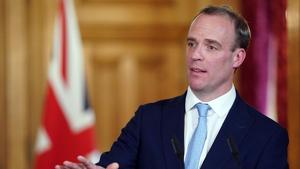 This file handout image released by 10 Downing Street shows Britain's Foreign Secretary Dominic Raab speaking during a remote press conference to update the nation on the COVID-19 pandemic in London on April 6, 2020. (PHOTO / AFP)
This file handout image released by 10 Downing Street shows Britain's Foreign Secretary Dominic Raab speaking during a remote press conference to update the nation on the COVID-19 pandemic in London on April 6, 2020. (PHOTO / AFP)
SEOUL / VILNIUS - Britain has imposed sanctions on Belarusian President Alexander Lukashenko and seven other officials over alleged election fraud and violence against protesters, Foreign Secretary Dominic Raab told Reuters on Tuesday.
Lukashenko’s national security adviser and chief of staff are also among the sanctioned officials, Raab said in an interview during a visit to the South Korean capital of Seoul.
Canada is also set to impose sanctions against Lukashenko and 10 other senior officials for committing human rights violations, its foreign ministry said in a statement.
Alexander Lukashenko’s national security adviser and chief of staff are also among the sanctioned officials, said British Foreign Secretary Dominic Raab
“There is a vanishing window to influence what is playing out in Belarus and we believe the time to take action is now,” Raab said. “First and foremost there must be a cost, there must be a price with the kind of human rights abuses that we’ve seen and the fraudulent approach to that election.”
Belarus has seen mass demonstrations since Lukashenko, in power for 26 years, was named the landslide winner of an Aug 9 presidential election his opponents say was rigged.
Raab said he had spoken with Britain’s international partners, and Britain had decided to move forward.
“We expect others will follow but I think time is of the essence because of that narrow window of opportunity to influence what is playing out,” he said.
Also on Tuesday, French President Emmanuel Macron met Belarusian opposition leader Sviatlana Tsikhanouskaya in Vilnius on the second day of a visit to Baltic countries meant to reassure them about French commitment to their security.
Tsikhanouskaya said Macron promised her to help negotiate with the Belarus authorities and secure the release of the political prisoners.
"He promised us to do everything to help with negotiations, (during) this political crisis in our country ... and he will do everything to help to release all the political prisoners”, Tsikhanouskaya told reporters in English after the meeting in Vilnius.
On Monday, on his first day in Vilnius, where Tsikhanouskaya fled into exile, Macron urged Belarus authorities to stop unlawful arrests, release protesters detained arbitrarily and respect election results.
He had urged Lukashenko to go on Sunday, hardening his stance as tens of thousands marched in Belarus for a seventh straight weekend to demand Lukashenko quit.
ALSO READ: Tens of thousands rally against Belarus president Lukashenko
Tsikhanouskaya fled Belarus after the Aug 9 election that the opposition said was rigged.
Macron is expected later in the day to visit French soldiers serving as part of a NATO battlegroup in the Lithuanian town of Rukla.
The French leader is keen to reassure Baltic countries that his policy of “strategic dialogue” with Russia, initiated about a year ago, and his criticism of NATO, does not mean weaker French commitment to the security of eastern European countries.



